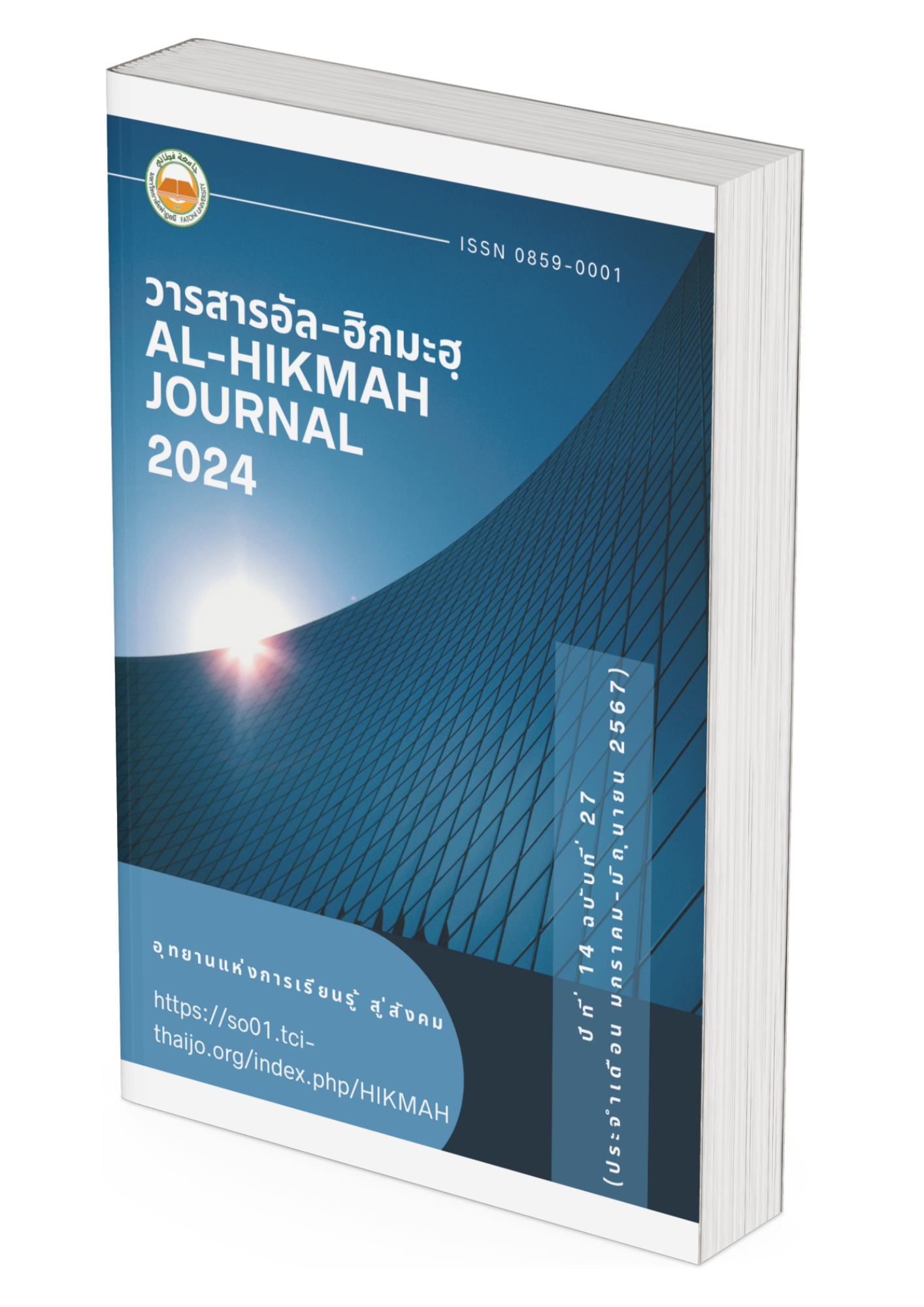Deriving Lessons from Foundational Understanding of Muslim Consumer Behavior Impacting the Development of Marketing Personnel's Capabilities to Meet Product Distribution Standards
Deriving Lessons from Foundational Understanding of Muslim Consumer Behavior Impacting the Development of Marketing Personnel's Capabilities to Meet Product Distribution Standards
Keywords:
Muslim consumption behavior, Capacity development, Marketing personnel, Product standardsAbstract
From an Islamic perspective, marketing is also important. The purpose of this study is to provide information, understanding, and motivation to implement marketing from an Islamic perspective. Exploring Islamic marketing innovation through qualitative research articles and studying the details of the literature and issues related to marketing from an Islamic perspective. Creating a comparison of the contents of the article is important for teaching halal business operators. In addition, to understand the Islamic market, Muslim consumers are an opportunity to generate income, expand their business in a better direction, and use the knowledge in the content to create a plan to make a difference in the operation.
References
Abuznaid, S. (2012). Islamic marketing: addressing the Muslim market.
Anggadwita, G., Ramadani, V., Alamanda, D. T., Ratten, V., & Hashani, M. (2017).
Entrepreneurial intentions from an Islamic perspective: a study of Muslim
entrepreneurs in Indonesia. International Journal of Entrepreneurship and
Small Business, 31(2), 165-179.
Federspiel, H. M. (1985). Islam and Development in the Nations of ASEAN. Asian survey,
(8), 805-821.
Gümüsay, A. A. (2015). Entrepreneurship from an Islamic perspective. Journal of business
ethics, 130, 199-208.
Hashim, N., & Hamzah, M. I. (2014). 7P's: A literature Review of Islamic marketing and
Contemporary Marketing MIx. Procedia-Social and Behavioral Sciences, 130,
-159.
Jafari, A., & Sandikci, Ö. (Eds.). (2016). Islam, marketing and consumption: Critical perspectives
on the intersections. Routledge.
Junaidi, J. (2022). Religiosity versus profit-loss sharing: how Islamic banks brand fidelity
influence the Muslim consumers’ commitment. Journal of Islamic Accounting
and Business Research, 13(6), 960-976.
Lam, W., & Harker, M. J. (2015). Marketing and entrepreneurship: An integrated view from the
entrepreneur’s perspective. International small business journal, 33(3), 321-348.
Mamun, M. A. A., Strong, C. A., & Azad, M. A. K. (2021). Islamic marketing: A literature review
and research agenda. International Journal of Consumer Studies, 45(5), 964-984.
Riaz, M. (2016). Islamic marketing ethics and the marketing practices of Islamic banks. ISRA
International Journal of Islamic Finance, 8(2).
Salaheldeen, M. (2022). Opportunities for Halal Entrepreneurs in the Islamic digital economy:
future and trends from a cultural entrepreneurship perspective. In Cultural
Entrepreneurship: New Societal Trends (pp. 95-107). Singapore: Springer
Nature Singapore.
Sandıkcı, Ö., & Rice, G. (Eds.). (2011). Handbook of Islamic marketing. Edward Elgar Publishing.
Wilson, J. A. J. (2012), “Looking at Islamic marketing, branding and Muslim consumer
behavior beyond the 7P’s”, Journal of Islamic Marketing, (3)212-216
ณั ฐพล สุวรรณ ริน ท ร์, & อร พรรณ คง มาลัย. (2565). The ปัจจัย ที่ ส่ง ผล กระทบ ของ กลยุทธ์ การ
ตลาด และ การ สร้าง แบรนด์ ต่อ การ ยอมรับ แอ พ พลิ เค ชั่ น กวด วิชา ของ กลุ่ม คน
รุ่น ใหม่ (Generation Z). วารสารวิชาการบัณฑิตวิทยาลัยสวนดุสิต, 18(3), 155-170.
พงษ์ศักดิ์ ผกามา (2562 ). การจัดการการตลาดแบบองค์รวมยุคใหม่: วิถีการตลาดสำหรับธุรกิจยุคเศรษฐกิจ
ดิจิทัล. วารสารนวัตกรรมการบริหารและการจัดการ, 7(1), 68-79.
วิรัตน์เตซะ นิรัติศัย. (2564). กลยุทธ์ทางการตลาดเพื่อรองรับมาตรฐานไทยแลนด์ 4.0. วารสาร วิจัย
มหาวิทยาลัยเวสเทิร์นมนุษยศาสตร์และสังคมศาสตร์, 6(2), 232-243.
Downloads
Published
How to Cite
Issue
Section
License
Copyright (c) 2024 Al-HIKMAH Journal

This work is licensed under a Creative Commons Attribution-NonCommercial-NoDerivatives 4.0 International License.



